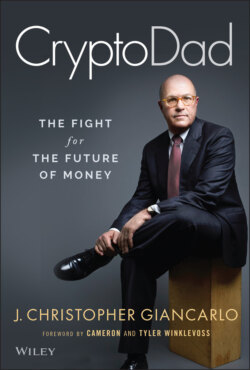Читать книгу CryptoDad - J. Christopher Giancarlo - Страница 34
Price Discovery
ОглавлениеUS derivatives markets are outstanding at providing efficient and undistorted price discovery. Farmers look at the prices set on agriculture futures exchanges to determine for themselves whether they are getting fair value for the crops they sell to local grain elevators. At the same time, the grain elevators use futures market prices as the basis for what they offer local farmers at harvest. The US Department of Agriculture uses that same information to make price projections, determine volatility measures, and make payouts on crop insurance.
The value of many of the world's most important agricultural, mineral, and energy commodities is reliably established in US futures markets. Importantly, those prices are set in US dollars. Dollar pricing of the world's commodities provides an enormous and unparalleled advantage to American producers in global commerce. Thanks to dollar pricing, neither producers nor consumers in the United States need a currency hedge on top of their commodities hedges.
US derivatives markets are also considered to be some of the world's best regulated. The United States is the only major country in the Organization for Economic Co-operation and Development to have a regulatory agency specifically dedicated to derivatives market regulation: the CFTC. There is a connection between singularly focused federal regulation and having the world's most competitive derivatives markets. For over 40 years, the CFTC has been recognized for its principles-based regulatory framework and econometrically driven analysis. The CFTC is respected around the world for its depth of expertise and breadth of capability. Too often underfunded, at times underestimated, certainly underrecognized, the CFTC is unquestionably the most innovation accommodating market regulator in Washington's alphabet soup of agencies. And, oh yes, unlike almost every other federal financial regulator, markets and institutions overseen by the CFTC did not fail during the 2008 financial crisis.
When I arrived at the CFTC, my focus was still on the recent past—the 2008 financial crisis and the regulatory response to it. I was determined to complete derivatives reform, but I was also resolved to do it in a way that would promote market efficiency and economic growth. I was particularly focused on two outstanding Dodd–Frank implementations: swap execution facilities and position limits.
Within three months of my swearing-in, an important change occurred in the commission's composition. Commissioner Scott O'Malia stepped down to join the International Swaps and Derivatives Association, or ISDA. During his almost five-year tenure, O'Malia had been a minority commissioner, meaning that his political party held no more than two seats on the five-member CFTC Commission. Under the CFTC's authorizing statute, up to three seats and majority voting power were with the other party, the party of the president, Barack Obama. Under that structure, O'Malia had nevertheless mastered the role of a minority commissioner, negotiating rule improvements when he could and issuing vociferous and well-articulated dissents when he could not. Even for CFTC rule proposals he voted against, O'Malia always seemed to be in detailed negotiations to the very end.
I would miss O'Malia's tutelage. His unexpected departure left me as the only Republican alongside three Democrats. Tim Massad, an exacting Wall Street lawyer, was the new chairman, giving him control of the entire agency staff and its agenda. Mark Wetjen, an earnest and approachable former high-ranking Senate staffer, was the most senior commissioner. Sharon Bowen, who had been paired with me during our Senate confirmation hearings, was a principled lawyer and consumer advocate.
In American football terms, I was a defensive free safety covering a capable quarterback and two skilled receivers. In that role, I had no authority to call the plays or direct the staff's rule writing and implementation. I had only a slightly better chance to get their focused attention. I had to use other means to influence it. I chose the written word. With the help of my brilliant staff counsel, Amir Zaidi, who had previously advised O'Malia, I set to work on the promised white paper. Writing it occupied much of the autumn and winter, including the holiday break.
